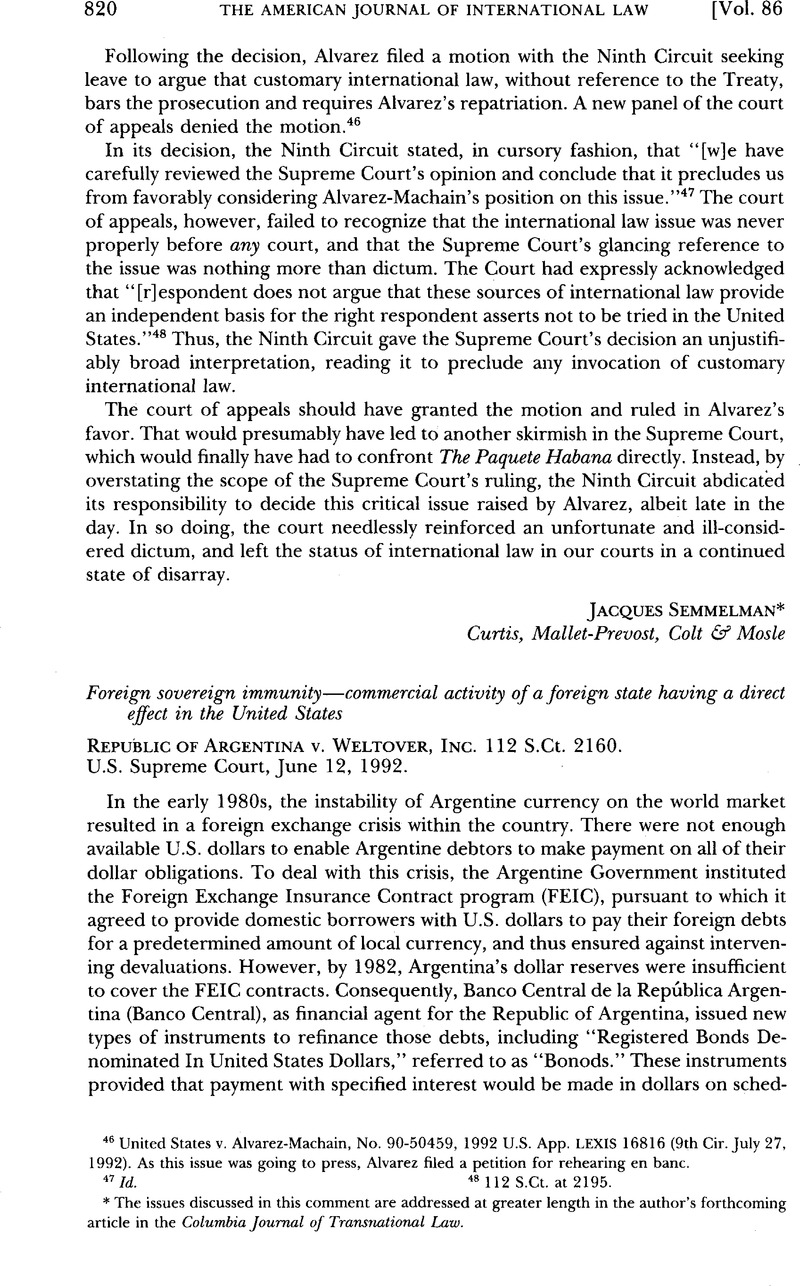Published online by Cambridge University Press: 27 February 2017

1 Although there were two distinct defendants in the action, the Republic of Argentina and Banco Central, no distinction was drawn by the Supreme Court, or apparently by counsel, between these two entities for purposes of the jurisdictional issues. They are referred to jointly in the opinion as “Ar gentina.”
2 28 U.S.C. §§1602–1611 (1988).
3 753 F.Supp. 1201 (S.D.N.Y. 1991).
4 941 F.2d 145 (2d Cir. 1991), summarized in 85 AJIL 560 (1991).
5 Section 1605(a)(2) provides that a foreign state shall not be entitled to immunity from jurisdiction in any case
in which the action is based upon a commercial activity carried on in the United States by the foreign state; or upon an act performed in the United States in connection with a commercial activity of the foreign state elsewhere; or upon an act outside the territory of the United States in connection with a commercial activity of the foreign state elsewhere and that act causes a direct effect in the United States. 28 U.S.C. §1605(a)(2) (1988).
6 Section 1603(d) defines commercial activity to mean: “either a regular course of commercial conduct or a particular transaction or act. The commercial character of an activity shall be deter mined by reference to the nature of the course of conduct or particular transaction or act, rather than by reference to its purpose.” 28 U.S.C. §1603(d) (1988).
7 112 S.Ct. 2160, 2165.
8 425 U.S. 682 (1976).
9 The classic statement of the act of state doctrine appears in Underhill v. Hernandez, 168 U.S. 250, 252 (1897):
Every sovereign State is bound to respect the independence of every other sovereign State, and the courts of one country will not sit in judgment on the acts of the government of another done within its own territory. Redress of grievances by reason of such acts must be obtained through the means open to be availed of by sovereign powers as between themselves.
10 425 U.S. at 704.
11 112 S.Ct. at 2166.
12 Id.
13 Id.
14 Id. at 2167.
15 H.R. Rep. No. 1487, 94th Cong., 2d Sess. 19 (1976), reprinted in 1976 U.S.C.C.A.N. 6604, 6618.
16 112 S.Ct. at 2168.
17 Id. The Second Circuit had also concluded that the effect in the United States of the defendants' failure to pay on the Bonods was sufficiently direct because it diminished the status of New York as a preeminent commercial center. 941 F.2d at 153. However, the Supreme Court rejected such an effect as “too remote and attenuated to satisfy the ‘direct effect’ requirement of the FSIA.” 112 S.Ct. at 2168.
18 112 S.Ct. at 2169.
19 The decision thus leaves intact existing case law, which had characterized currency control regula tions as sovereign activity. See, e.g., West v. Multibanco Comermex, S.A., 807 F.2d 820 (9th Cir. 1987); Braka v. Bancomer, S.A., 589 F.Supp. 1465 (S.D.N.Y. 1984), aff'd, 762 F.2d 222 (2d Cir. 1985); Callejo v. Bancomer, S.A., 764 F.2d 1101 (5th Cir. 1985).
20 See, e.g., Stena Rederi AB v. Comision de Contratos del Comite, 923 F.2d 380, 390 (5th Cir. 1991) (financial loss suffered by a Swedish corporation is an effect in Sweden); Transamerican Steam ship Corp. v. Somali Democratic Republic, 767 F.2d 998, 1003–04 (D.C. Cir. 1985) (acts of foreign state abroad causing U.S. corporation to transfer funds out of United States caused direct effect in United States). Interestingly, the Second Circuit has rejected the argument that the direct effect requirement is met simply if a U.S. corporation suffers financial loss as the result of the action of a foreign state. In Antares Aircraft v. Federal Republic of Nigeria, 948 F.2d 90, 95 (2d Cir. 1991), that court held, in a case decided after its opinion in Weltover, that the direct effect requirement is met only if some legally sufficient act giving rise to the claim occurs in the United States.
21 See testimony of Bruno A. Ristau, Chief of the Foreign Litigation Committee of the Department of Justice's Civil Division, in Jurisdiction of U.S. Courts in Suits against Foreign States: Hearings on H.R. 11315 Before the Subcomm. on Administrative Law and Governmental Relations of the House Comm. on the Judiciary, 94th Cong., 2d Sess. 31 (1976) (“The bill is not designed to open up our courts to all comers to litigate any dispute which any private party may have with a foreign state anywhere in the world.”).